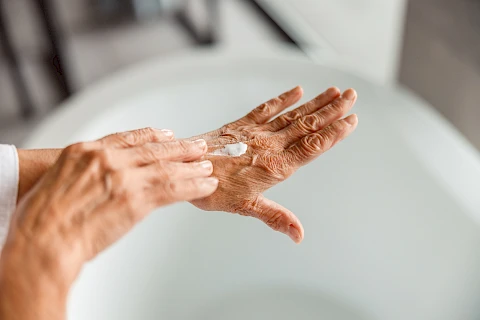
Winter can be a tough time for seniors, especially when it comes to skincare. The cold air and indoor heating can cause dryness and irritation. For seniors with chronic health conditions, like diabetes or autoimmune disorders, winter skin care becomes even more important. These conditions can make the skin more fragile, adding to winter's challenges.
Caregivers play a vital role in ensuring seniors maintain healthy skin during these months. With the right approach, as Senior Helpers Berkeley will outline, you can help your loved ones avoid complications and keep their skin comfortable and protected.
The Impact of Chronic Conditions on Skin
Chronic conditions can greatly affect skin health. Diabetes, for example, can reduce blood circulation, making skin more prone to dryness and infections. Autoimmune disorders might cause the skin to be more sensitive or fragile.
During winter, the cold air can strip the skin of its natural moisture. This makes it easier for skin to crack or become sore. Senior skin is already thinner and less resilient, so these additional factors can increase the risk of skin problems.
Selecting the Right Skin Care Products
Always opt for gentle, fragrance-free options, as fragrances and dyes can irritate delicate skin. Seniors should look for products labeled as hypoallergenic. Moisturizing ingredients like glycerin, urea, and hyaluronic acid are also excellent for maintaining skin hydration. Brands like CeraVe, Eucerin, and Aveeno offer suitable options that are both effective and gentle. Spending more time selecting the right products can make a big difference in preventing skin issues.
Daily Winter Skin Care Routine for Seniors
Developing a daily winter skin care routine can help seniors maintain their skin health throughout the season. Seniors can start with a gentle cleanser that won't strip their skin of its natural oils, then follow with a rich moisturizer, applying it while their skin is still damp to trap moisture.
Don't forget to moisturize areas like the hands and feet, which are often overlooked. Hydration is also important, so encourage seniors to drink plenty of water. Make it a habit to check their skin regularly for any signs of dryness or irritation. This routine can easily become a part of day-to-day care, ensuring issues are caught early.
Monitoring and Maintaining Skin Health
Be on the lookout for signs of dryness, redness, or any sores that might develop. Caregivers should perform regular skin assessments and pay particular attention to areas prone to pressure or friction. If you notice any persistent issues, seek professional advice. Dermatologists can provide additional guidance or treatment if needed. Regular monitoring ensures that any skin concerns are addressed promptly before they develop into serious problems.
Preventing Complications From Dry, Fragile Skin
Ensuring the home environment is humidified is also an important part of winter skin care for seniors. A humidifier can add moisture to the air, preventing seniors' skin from drying out. Seniors can also consider using soft clothing and bedding to reduce friction.
Good nutrition is equally important. A balanced diet rich in vitamins and minerals supports overall skin health. Keeping a holistic approach can prevent many potential skin challenges.
Discover Custom Care Services From Senior Helpers
Winter skin care should be a priority, especially for seniors with chronic health conditions. By understanding the specific needs of their skin, caregivers can better protect their loved ones from winter's harsh effects. Regular skin assessments and selecting appropriate products play an important role in maintaining skin health.
If you're a caregiver, be proactive and attentive to your loved one's skin needs. For those in Berkeley, Oakland, Richmond, Kensington, and El Cerrito, contact us at Senior Helpers Berkeley for additional support and personalized care solutions. A little care can go a long way in keeping skin healthy throughout the winter months.